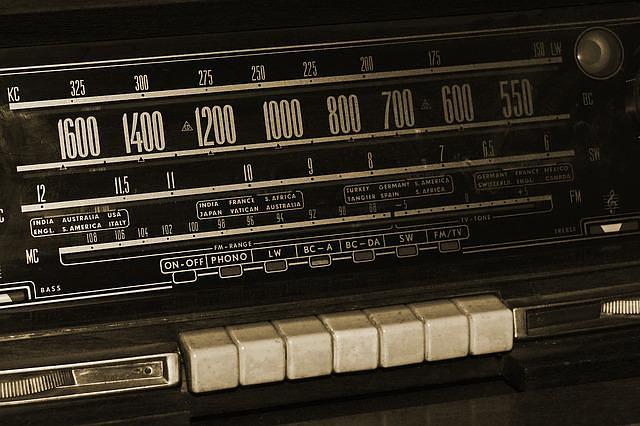Looking for more in Writing and Authors?
Hearing voices: Muriel Spark on the radio
Professor Willy Maley explores how Muriel Spark's life and work was intimately connected to the medium of radio. Originally published Monday 12 December 2016.

For Muriel Spark, radio was a religious experience. Inspiration came to her through the wireless, as it was called in her childhood home. Spark had a Jewish father and a Presbyterian schooling, yet in her youth, she said, “I had no specific religion but at the same time I had a strong religious feeling. There were times when, listening to lovely music on the radio… I was aware of a definite ‘something beyond myself’”. That “something beyond” herself came closer when Spark converted to Catholicism in 1954 at the age of thirty-six. She became a novelist as a consequence of her conversion, which she described with characteristic understatement: “I’d been reading towards it for years and one wet afternoon I did it.”
Radio and rainy days played a large part in Spark’s life. In her note to her collection of radio plays and stories entitled Voices at Play published in 1961, she confessed: “I never quite grasped the distinction between dramatic features and plays except to discern what was in my favour, namely the freedom to do as I pleased with characters and voices without thought of conforming to a settled category. I turned my mind into a wireless set and let the characters play on my ear”. The four short dramas for radio in Voices at Play – “The Danger Zone”, “The Dry River Bed”, “The Interview”, and “The Party Through the Wall” – were first broadcast by the BBC as part of the Third Programme, commissioned by John Rayner Heppenstall. Of course, many of Spark’s short stories are also great for radio, and some have been broadcast, but these commissioned dramatic pieces, aimed at listeners in a much more immediate way, still feel fresh and demand another airing.
Voices were vital means by which Spark breathed life into her creations. In Loitering with Intent (1981), short-listed for the Booker Prize, Fleur Talbot reflects on her “artistic apprehension” in ways that offer an insight into Spark’s way of writing: “My ears have a good memory. If I recall certain encounters of the past at all, or am reminded perhaps by old letters that they happened, back come flooding the aural images first and the visual second”. Spark’s versatility with voices is the key to her dramatic and poetic imagination. She is a great listener. Or as the narrator in “Come Along, Marjorie” puts it, “my ears were windows”. Listening and hearing, eavesdropping and being overheard are recurrent themes in Spark’s fiction, often linked to blackmail and paranoia.
The Abbess of Crewe (1974), with its convent wired for sound, is often viewed as an allegory of Watergate. It is, but the novel also draws on Spark’s wartime experience working in counter-propaganda, broadcasting misleading reports that drew on the taped voices of captured Germans, as she recalls in Curriculum Vitae: “Another source of intelligence came from the prisoner of war camps. The walls of the quarters were bugged as were the trees under which they strolled. This yielded the average soldier’s state of mind and the latest slang expressions”. Her wartime experience made its way into Spark’s fiction, when in The Abbess of Crewe the Abbess says: “The trees of course are bugged”. Later, a nun interrupts a reading from scripture to insert a passage from a radio manual: “In recording, the tape is drawn at constant speed through the airgap of an electromagnet energized by the audio-frequency current derived from a microphone. Here endeth the reading. Deo gratias”. If religion could come through the radio then the radio could interrupt a religious service.
In wartime London, Spark passed the test for entry to the secret service – working in “Political Intelligence” at the “brain-tank” at Milton Bryan – because she knew what not to know: “Great signs were plastered over the walls of public buildings: ‘Careless Talk Costs Lives’”. Spark’s modest but vital contribution was brilliant experience for a writer: “I played a very small part, but as a fly on the wall I took in a whole world of method and intrigue in the dark field of Black Propaganda or Psychological Warfare, and the successful and purposeful deceit of the enemy”.
And of course, working in “Black Propaganda” meant working with the wireless: “There were two radio stations. First, the Soldiers’ Radio Calais (Soldatensender Calais) and secondly, in the last phases of the war when I had joined the unit, the powerful Radio Atlantic (Deutscher Kurzwellensender Atlantik)”. Twenty years before the BBC would broadcast her radio plays, Spark was learning her craft through the Foreign Office: “Black propaganda was distinct from the BBC’s white variety. Black took up the position that we were loyal Germans devoted to the Führer. From that point of view the news was presented in such a way that the Germans got the impression that they were listening to a German station. This was a camouflage for subtle and deadly anti-Nazi propaganda.” Spark’s experience of radio propaganda, in addition to her schooling, her secretarial skills, and her travels in Africa, was pure gold for an aspiring writer: “Detailed truth with believable lies: this was outside the scope of the BBC who boasted clearly of our strength, and disparaged the enemy.”
Spark’s first novel, The Comforters (1957), is also about “voices at play”. It features a talking tapping typewriter and marks a lifelong obsession with the disembodied voice. Louisa Jepp listens to her grandson, Laurence Manders, sports commentator with the BBC: “[She] sat beside the wireless cuddled in the entranced carcass of Laurence’s voice”. Listen to Spark’s language here. This is not about the carcass of the radio, or the ghost in the machine, but the “entranced carcass” of the voice itself. What Louisa hears is a familiar but strange and disembodied voice and this is what she hears it say: “Absolutely perfect … A pass back there – a foul tackle and the whistle … the sun has come out, everything looks absolutely perfect with the red coats of the band … that feeling of – of tenseness … and now again for the second half … the first dramatic … absolutely perfect … it’s a corner, a goal to Manchester City … a beautiful, absolutely …” This match commentary dates from the year the novel was published, but could be from any given Saturday. Spark won the Prix d’Italia for Radio Drama for an adaptation of another novel, a musical version of The Ballad of Peckham Rye broadcast for the BBC’s Third Programme on Sunday 27 May 1962, with lyrics by Spark – sung down the telephone – set to music by pioneering composer Tristram Cary, son of the author Joyce Cary.
In A Far Cry from Kensington (1988), a novel set in the years before Spark’s conversion and career as a writer, based on her experiences in the publishing industry, there’s an insight into how music and memory and aural imagination works. The tenants of a rooming house get some good news: “Now, to cheer things up still further, someone had turned on the wireless to Radio Luxembourg with its late-night dance music”. While one resident asks for the music to be kept low, another takes advantage of the moment. “Suddenly William Todd came out to the garden. ‘What a moon!' he said. He took my hand and put his other arm round my large waist as far as it could reach, and danced me all over the lawn to the sound of the music, he in his cotton pyjamas and I, Mrs Hawkins, in my black lace party dress”. That moonlit dance feels like a far cry from the past, a musical memory. One always has the impression with Spark that she draws on life by listening to her memories.
In her remarkable 1975 New Yorker story, “The First Year of My Life”, Spark, born in the last year of the First World War, offers a child’s perspective, tuning into contemporary events: “The Western Front on my frequency was sheer blood, mud, dismembered bodies, blistered crashes, hectic flashes of light in the night skies, explosions, total terror”. When I think of Spark, I think of a subtle and sophisticated stenographer able to articulate an enormous range of “phrase ripples” – to borrow a phrase from Girls of Slender Means. I think of the film Frequency (2000) with Dennis Quaid, where broadcasts from the past break into the present. Spark knew the power of cross-time radio links and their capacity to bring voices from the past into play in the present. I think of Spark’s early radio plays now, still rippling into outer space, her far cry reaching new and unknown listeners.
Spark’s ear for dialogue and love of radio has not gone unnoticed. In British Radio Drama (1981) the critic Donald A. Low wrote: “Muriel Spark has as sure an ear for idiosyncrasies of speech as anyone in modern fiction, and there is little doubt that with the kind of commitment to radio she has brought to the novel she could have become an outstandingly successful radio dramatist – perhaps she may yet choose to do so”. There’s still time. Radio drama is a more familiar form than it was when Spark started experimenting nearly sixty years ago, so perhaps she still has a future in that medium. Without doubt many of her stories, plays and poems deserve renewed attention in a variety of media, some of which she could not even have imagined.
